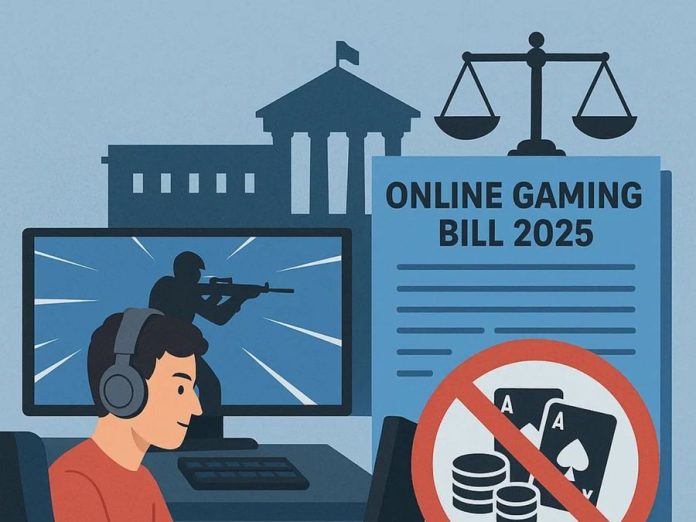When the smartphone first entered our lives a little over a decade ago, few could have imagined that it would transform not only the way we talk, shop, and pay—but also the way we play. From children spending hours on digital puzzles to young adults competing in high-intensity e-sports tournaments streamed online, gaming in India has grown from a niche hobby into a mainstream cultural and economic force.
But as with every digital revolution, the rise of online gaming has carried both promise and peril. Alongside the explosive growth of e-sports and skill-based social games, India has also seen the darker side of online gaming—money games, gambling apps, and predatory platforms that exploit users with promises of quick riches, often leaving families in financial and emotional distress.
It is against this backdrop that the Government of India, led by Information & Broadcasting Minister Ashwini Vaishnaw, has introduced the Promotion and Regulation of Online Gaming Bill, 2025. The landmark legislation takes a dual approach: nurturing the booming e-sports and cultural gaming ecosystem on one hand, while imposing a complete ban on online money gaming—which includes betting, gambling, fantasy sports, and real-money card games.
Balancing Innovation with Protection
The new Bill recognizes the immense potential of gaming as a sport, an industry, and a career path for India’s youth. E-sports is set to be given the same legitimacy and recognition as traditional competitive sports. At the same time, the government has drawn a firm line against money games—viewing them not as entertainment but as exploitative activities that can lead to addiction, financial losses, and even tragedies like suicides.
“Technology has transformed India, but with it, new risks have also emerged. The Government’s priority is to protect citizens, especially the youth, from digital harms while ensuring innovation thrives,” Minister Vaishnaw said while tabling the Bill.
What the Bill Proposes: Key Highlights
1. E-sports Gets Official Recognition
For the first time, e-sports will be officially recognised as a legitimate competitive sport in India. The Ministry of Youth Affairs & Sports will frame guidelines, establish training academies, create technology platforms, and even integrate e-sports into broader sports policies. This means more structured tournaments, professional opportunities, and pathways for young talent to shine globally.
2. Boost for Social & Educational Gaming
Not all games are about scoring points or winning battles. Many online games foster creativity, learning, and cultural awareness. The Bill empowers the government to categorise and register such “social games,” ensuring that safe, age-appropriate, and skill-building games get the push they deserve. This includes educational games, cultural content, and digital literacy platforms aligned with Indian values.
3. Absolute Ban on Money Games
The most hard-hitting provision of the Bill is the total ban on online money games—irrespective of whether they are based on chance or skill. This includes popular real-money card games (like poker and rummy), online lotteries, fantasy sports, and any platform that promises monetary rewards.
-
Advertisements for money games will be outlawed.
-
Banks and UPI platforms will be prohibited from processing payments related to such games.
-
Offenders face up to 3 years in jail and/or fines up to ₹1 crore. Repeat offenders could face penalties as high as ₹2 crore.
4. Creation of an Online Gaming Authority
To ensure smooth oversight, a national-level authority will be established. This body will register and categorise games, determine whether a game qualifies as a money game, handle complaints, and issue compliance guidelines.
5. Strict Enforcement & Penalties
-
Offering money games: Up to 3 years imprisonment / ₹1 crore fine.
-
Advertising money games: Up to 2 years imprisonment / ₹50 lakh fine.
-
Financial facilitation of money games: Up to 3 years imprisonment / ₹1 crore fine.
The offences are non-bailable and carry enhanced punishment for repeat violations.
6. Corporate Liability
Companies and their executives can be held responsible if their platforms are found violating the Act. However, independent directors not involved in day-to-day decision-making will be protected.
Why the Ban?
The government’s stance is clear: real money games are not entertainment, they are exploitation. Beyond addiction and family distress, authorities have flagged serious concerns about such platforms being misused for money laundering, terror financing, and even covert communication threatening national security.
By aligning the online world with India’s offline laws—which already prohibit gambling—the Bill closes the gap that had allowed grey-market operators to flourish.
A Big Step for India’s Digital Economy
Interestingly, the Bill does not see gaming purely as a regulatory challenge but also as a driver of India’s creative economy. By promoting safe and positive forms of gaming, the government hopes to:
-
Create new job opportunities in gaming development, e-sports management, and content creation.
-
Strengthen India’s role in the global gaming export market.
-
Encourage innovation in digital storytelling, culture, and learning.
Industry at a Crossroads
While the move has been hailed by many as necessary to protect youth, the industry will likely see mixed reactions. E-sports startups, edtech-gaming companies, and creative studios stand to benefit, but real-money gaming platforms—some of which had grown into billion-dollar ventures—now face an existential threat.
For India’s 450+ million gamers, the Bill could reshape the way they engage with games online. The clear distinction between e-sports/social games and money games means the industry will now evolve with a sharper focus on entertainment, skill, and learning rather than gambling and speculation.
The Promotion and Regulation of Online Gaming Bill, 2025 is perhaps one of the most ambitious attempts globally to strike a balance between innovation and safety in the digital gaming world. It underscores India’s intent to not only become a leader in gaming innovation but also to set benchmarks in responsible digital policy-making.
For the young gamer dreaming of representing India in global e-sports tournaments, the Bill offers a brighter future. For the family struggling with the financial traps of predatory apps, it offers relief. And for India’s digital economy, it signals yet another step toward becoming a global leader in safe, secure, and innovation-driven technology.
